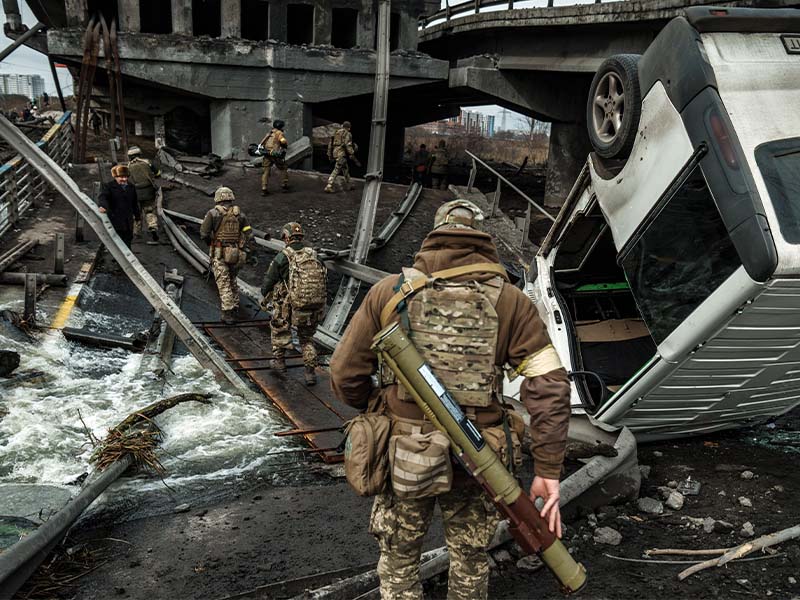Exclusive
The Dire Situation Facing Russia in Ukraine – and the Possible Way Ahead
Gen. David Petraeus explains the reality of Russia’s war in Ukraine, and how allies can continue to help Ukraine in its fight against Russia.

The reality facing Russia in Ukraine is exceedingly dire: Ukraine now has a larger, more capable military in Ukraine than does Russia, and that situation appears irreversible at this point. The United States and our NATO allies and western partners need to do all that we can to continue to help Ukraine and ensure that the reality that confronts Russia becomes even more dire than it presently is.
I was privileged to participate in the Warsaw Security Forum two weeks ago and to engage in a number of meetings with senior members of the Ukrainian delegation who were there. The week before that I was in Berlin meeting with government and European business leaders. And last week, I conducted a virtual engagement with a key advisor of Ukrainian President Zelensky. These engagements and careful analysis of the War in Ukraine from the outset have solidified my convictions about a number of realities that I believe are central to understanding the situation in Ukraine at this point.
- The Ukrainian people are absolutely determined to liberate their entire country, including Crimea and the Donbas, not just the area seized since the invasion launched by Russia on 24 February. Recent Russian strikes targeting civilian infrastructure have strengthened, not weakened, Ukrainian resolve.
- As noted at the beginning, the Ukrainian military is now larger and more capable than the Russian military in Ukraine. This is the result of Ukraine’s leaders doing a vastly better job of mobilizing their entire country than have Russian leaders done in theirs. Ukraine has done incomparably better than Russia at recruiting, training, equipping, organizing, and employing additional soldiers and forces – aided enormously, of course, by extraordinary amounts of military and economic assistance provided by the US and other NATO and western countries.
- Nothing Putin has done, or realistically can do, not the annexation of, and martial law in, four Ukrainian provinces, partial mobilization in Russia, or the threat of the use (or actual use) of tactical nuclear weapons can reverse that dynamic – though as the Ukrainians liberate more of their territory, Russian forces will reduce the size of the areas they are defending, and that will increase the density of their defenses, at the least.
- The major capability that Russia now has is the ability to punish Ukraine with missiles, rockets, artillery, bombs, and swarms of Iranian suicide drones – as we have seen in the two weeks since an explosion seriously damaged the Kerch Strait Bridge that connects the Crimean Peninsula with Russia and is a critical (and now seriously damaged) route for resupply of Russian forces in southern Ukraine.
- The Ukrainian desire to halt Russia’s punitive strikes may ultimately give Russia its best leverage, while the West’s leverage, in coordination with Ukraine, will be Russia’s desire to get from under the substantial sanctions and export controls imposed on Russia since the invasion.
- We are likely quite some time, more tough fighting, additional Russian destruction of Ukraine’s civil infrastructure, more difficult casualties, and further Ukrainian liberation of their territory – from eventual negotiations that might bring the fighting to an end. And for Ukraine ultimately to be viable in security and economic terms, it to liberate a large number of areas, if not all of Ukraine, that would be critical to the establishment of strong defensive positions and the restoration of its economy and reconstruction of its infrastructure.
- Finally, the pace of further Ukrainian advances is difficult to predict, as it will depend not just on the increasing capabilities of Ukrainian forces, but also on how much Russian forces crumble and, in some cases, perhaps, collapse.
So what does this mean? It forecasts a prolonged war, more terrible casualties, steady Ukrainian liberation of their territory (sometimes slowly, sometimes more rapidly), and much more Russian damage and destruction of Ukraine’s infrastructure.
In turn, our response should be very clear: in my view, this is as clear-cut a situation as can be. It is truly good versus evil that has carried out an unprovoked war of conquest; and democracy, however imperfect, against kleptocracy that seeks to use its commodities, minerals, and agricultural exports as weapons to blackmail European countries and others. The US has done a very impressive job leading the NATO and global response to Russia’s brutal invasion, having now provided well over $18B worth of arms, ammunition, and materiel, as well as over $13B in economic assistance. Other countries have been providing substantial assistance as well. Beyond that, I do believe that NATO and European unity will endure, despite the inevitable challenges of the winter ahead with much reduced Russian natural gas and the domestic challenges that will emerge as energy costs spiral upward, economies around the world slow down, and inflation creeps up.
We thus need to do all that we can to continue supporting Ukraine, with additional arms, ammunition, and economic assistance. And at an appropriate moment, in careful coordination with Ukraine and our NATO allies and western partners, we should help initiate negotiations that can stop the violence and extricate Russia from a war that clearly has been disastrous and has, in its first 8 months alone, already seen 3-4 times more Russia losses than the Soviet Army experienced in some 9 years in Afghanistan. And we will need to do all this while supporting a durable security situation for Ukraine, a Marshall Plan-like effort with our allies to rebuild Ukraine’s battered infrastructure and economy, and a security guarantee that likely includes a path to NATO membership for Ukraine – which the performance of Ukraine’s military men and women in uniform have more than earned by their courage, determination, resourcefulness, initiative, and selfless service in what has come to be seen as Ukraine’s War of Independence.
General David Petraeus, US Army (Ret.) is one of the most prominent Soldier-Scholar-Statesmen of the 21st Century. He is currently a Partner with the global investment firm KKR and Chairman of the KKR Global Institute. Prior to joining KKR he served over 37 years in the US Army, culminating his service with 6 consecutive commands as a general officer, five of which were in combat, including command of the Surge in Iraq, US Central Command, and NATO/US Forces in Afghanistan. Following retirement from the military and confirmation by the Senate by a vote of 94-0, he served as Director of the CIA. He graduated with distinction from the US Military Academy, later earned a Ph.D. at Princeton, and has had academic affiliations with USMA, Georgetown, CUNY’s Honors College, the University of Southern California, Harvard, and Yale.
Events aren’t easy, but working with WSB is. WSB works with thousands of respected influencers, thought leaders, and speakers each year and our experienced sales team is committed to the success of your event. For more Russia-Ukraine speaker ideas, please contact us.
